The performance of the economy, several studies have shown, is an important factor voters consider in deciding who to vote for in national elections in any country in the world, including Ghana.
As the 2024 general election approaches, politicians in Ghana will have their A-game on; making all forms of claims on their achievements, especially on who the better manager of Ghana’s economy is.
One of the important measures of the performance of the economy, which is perhaps more concerning to Ghanaian households, is the ‘almighty’ INFLATION – the increase in prices of goods and services.
Politicians can argue that they have stabilised other macroeconomic variables like the exchange rate, interest rate, and the like, but what ordinary Ghanaians are mostly concerned about is whether they can afford to put food on the table for themselves and their families.
This article explores data on inflation rates in the 4th Republic of Ghana.
History of inflation rates in the 4th Republic of Ghana:
The data shows that in the history of Ghana’s 4th Republic, which has seen 16 years of National Democratic Congress (NDC) and 16 years of New Patriotic Party (NPP) government, the highest yearly inflation rate the country has ever seen was in 1995 during the late former President Jerry John Rawlings' tenure, where it recorded a yearly inflation rate of nearly 60%.
The second-highest yearly inflation rate, nearly 42%, was recorded under the NPP government of former President John Agyekum Kufuor in 2001, and the third-highest, over 31%, was seen under the current Nana Addo Dankwa Akufo-Addo government – also an NPP government – in 2022.
Also, the data shows that even though the lowest yearly inflation rate in the history of the 4th Republic was in 1999 during the era of the late Rawlings, when the average price of goods and services rose by less than 5%, the second-lowest and third-lowest yearly inflation rates were seen under the Nana Addo Dankwa Akufo-Addo government in 2019 and 2018, with inflation rates of approximately 7.1% and 7.8%, respectively.
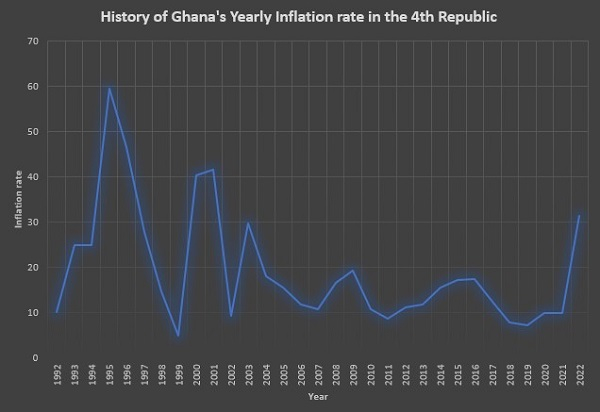
Source: World Bank data, Author’s Analysis
Inflation rate in the last 8 years of NDC and NPP governments:
Now, let us take a look at the recent history of inflation under the latest NDC and NPP governments. Here, a comparative analysis will be done between the 8-year Prof John Evans Atta Mills/John Dramani Mahama's reign and the 8 years of Nana Addo Dankwa Akufo-Addo.
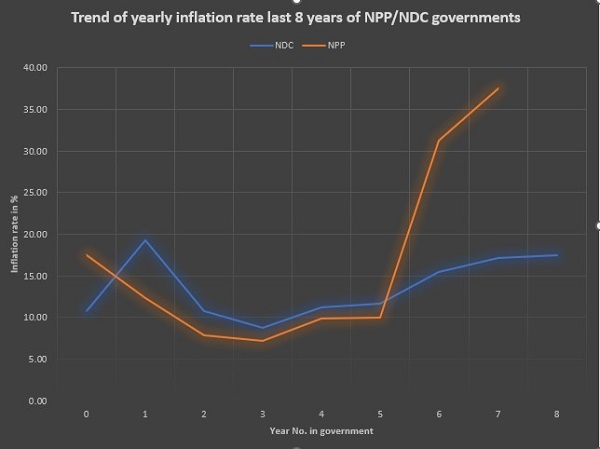
Source: World Bank data, Author’s Analysis
As can be gleaned from the graph above; inflation rose sharply in the first year of the John Evans Atta Mills government from a yearly inflation rate of about 11% it inherited to over 19%, while the first year of the Nana Addo Dankwa Akufo-Addo government saw a reduction in the yearly inflation rate from the over 17% it inherited to a little over 12%.
In fact, the data shows that in their first five years of governing, the yearly inflation rates under the NPP were also lower than those of the NDC. It was after the 5th year that the inflation rate under the NPP government exceeded that of the NDC.
From the 5th year of the NDC government, which had Mahama as president, yearly inflation rose steadily from approximately 12% in 2013, to 15% in 2014, 17% in 2015, and 17.5% in 2016.
For the Akufo-Addo government, yearly inflation skyrocketed from its 5th year, increasing from approximately 10% in 2021 to over 31% in 2022. The yearly inflation rate further increased to nearly 38% in 2023 and is projected to be less than 25% in 2024.
Comparison between Ghana and other West African countries:
Proponents of the Akufo-Addo government argue that the main cause of the drastic increase in the prices of goods and services in Ghana is the global impact of the COVID-19 pandemic and the Russia-Ukraine war.
However, some economic experts, such as Prof Lord Mensah, a senior lecturer at the University of Ghana, have rejected the reasoning of the government, stating that the two external factors affected every country in the world, but countries with poor economic fundamentals like Ghana suffered the worst economic consequences.
Most experts point to the inflation rate of Ghana and that of its West African neighbours as proof that COVID-19 and the Russia-Ukraine war cannot be the only cause of the country's economic challenges, including the astronomical increase in the prices of goods and services.
For instance, Ghana's inflation reached a decade-high in December 2022, during the height of the COVID-19 pandemic, at over 54%, while most of its neighbours were recording single-digit inflation rates.
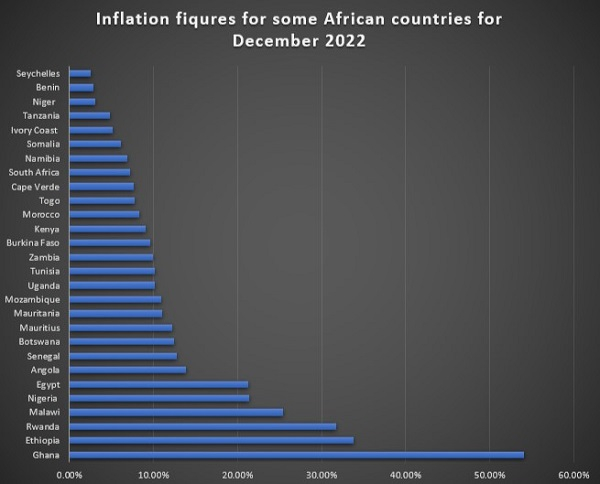
Source: mariblock data, Author’s Analysis:
Also, current inflation figures show that Ghana has one of the highest inflation rates in Africa despite the COVID-19 pandemic being over for years.
Even though the country’s inflation figure has more than halved since December 2022 and is hovering a little above 20%, most of its neighbours have inflation rates below 5%.
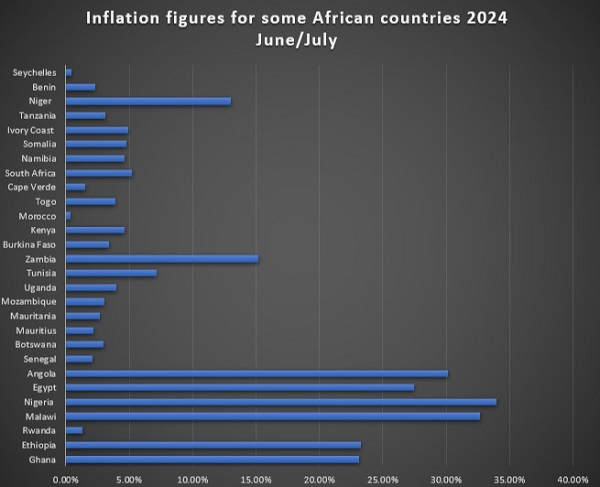
Source: Trading Economics data, Author’s Analysis:
Below are the percentage increases in prices of some common items in Ghanaian households.
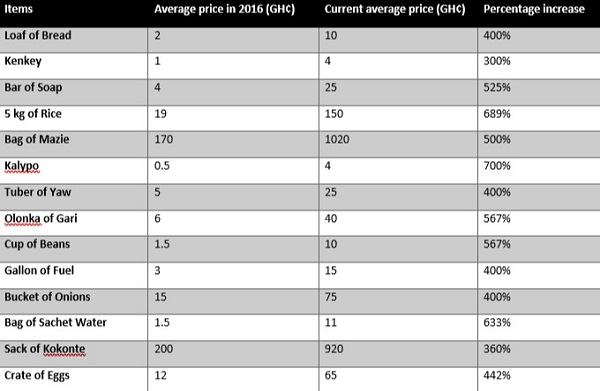
BAI/NOQ